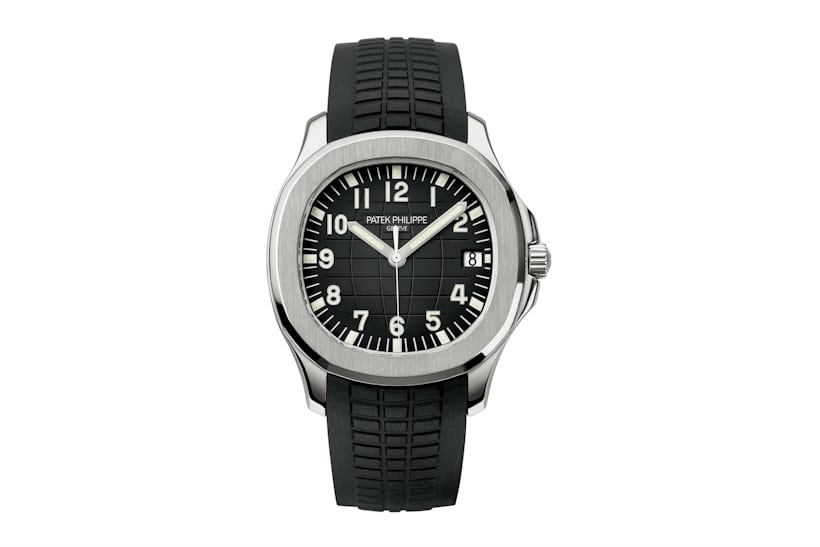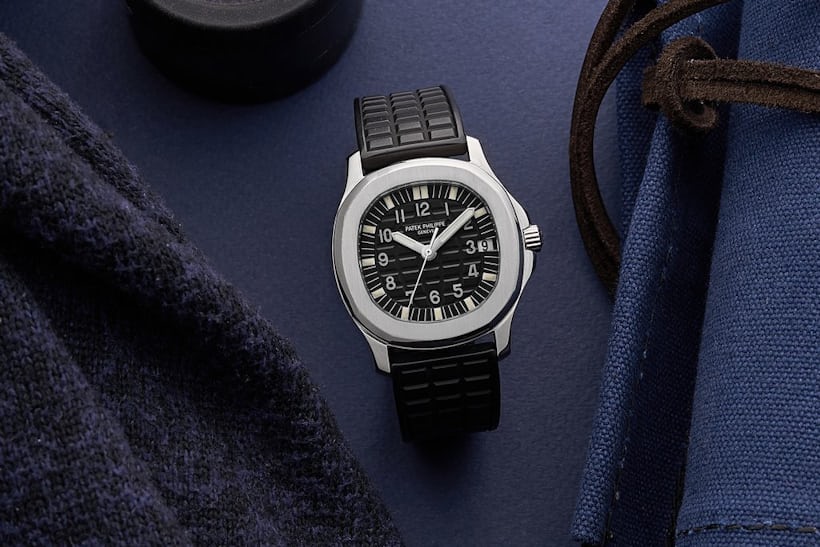he watch market has a hierarchical structure. Collectors devote their lives and their bank accounts to determining which ones are the absolute best – empirically speaking. Of course, that’s just not possible. Sure certain timepieces are built better than others, look better than others, and have more impressive movements than others, but at the end of the day we buy what we love. More realistically, we buy what we can afford.
Many of us have dreamed of owning a Patek Philippe – and almost any Patek will do. And for a moment it’s heartening to remember that every watch brand (even the most elite) has its entry point: Something has to be the cheapest item on the menu, even if it’s no one’s definition of “cheap.” When I started looking into it, I actually wasn’t sure what Patek’s mechanical entry point would be. Maybe the Calatrava? Nope.

When I finally realized it was the Aquanaut, at just over $20k, I was taken aback. But setting aside Patek’s two quartz options (that’s right, Patek Philippe still makes quartz watches), it’s absolutely true. You can look it up on the brand’s website, which features a helpful tool allowing you to sort these luxury watches by retail price – a hilarious function on two levels. One, because nobody who can afford a Patek needs to sort by retail price. And two, because nobody can buy these watches at retail anyway.
The Aquanaut ref. 5167A-001 can trace its lineage all the way back to the famed Gérald Genta-designed Nautilus. The Aquanaut was unveiled in 1997, the tail-end of a decade not necessarily known for producing collectible watches. And indeed the model has real ’90s design sensibilities, despite the ’70s Nautilus inspiration. When else would watch designers be so bold as to take a Patek case and affix it to a rubber strap?

The Patek Philippe Aquanaut 5060A
The Aquanaut was originally conceived, purposefully, as the entry-level Patek – designed to appeal to younger buyers who’d never purchased from the brand before. The look and feel was intended to balance sportiness with a certain military feel. The original 5060A had, what collectors call a “grenade” dial due to the deep pattern on the dial. This pattern extended from the case onto the strap – a pattern Patek refers to as Tropical (possibly a reference to the Tropic straps of the 1970s).

The Patek Philippe Aquanaut 5060A
In many ways, the Aquanaut has long lived in the shadow of its iconic older sibling. Many aficionados consider it a plan-B alternative for Patek buyers who can’t score a Nautilus because the waitlist is too long.
At the moment, a current-generation Aquanaut 5167A at retail (dream on), costs a cool $21,650. You won’t be finding that kind of scratch in a forgotten piggy bank or an old jacket pocket. This is Patek, a brand whose only rival in terms of recognizability and desirability is Rolex, the Crown itself. You think Patek, you think money, and this entry-level piece requires plenty of it – though less than you’d pay for a simple gold, time-only, manual-wind Calatrava ($24,600), a steel Nautilus 5711 ($34,890), or a white-gold 5396G ($53,460).

So let’s say you have the dough, and you’re ready to enter the insiders-only world of Patek. What would you do? If you were a logical individual in a rational capitalist society, you might ask yourself: “Where’s the nearest boutique?” And off you’d go, expecting to be gallantly led inside to pick out and take ownership of your watch. But in the real world, you’d face a problem: No Aquanaut for you inside the case. A steel sport Patek is a rare bird. As of 2019, Patek only manufactured something like 62,000 watches in a year – and only about 20 percent of those were steel.

Photo: Sotheyb’s
“We don’t want to focus too much on steel,” Thierry Stern, the brand’s CEO, told Forbes in 2019. “Steel is a metal that is important when business is slower and brands can’t sell their more expensive watches.” Needless to say, this is not a problem Patek Philippe has. Stern added that steel “is a small percentage of our business and will remain small.” For this reason, waitlists can sometimes be twice to three times as long as for a Rolex watch – measured in years, plural. And that’s assuming you already have a relationship with an authorized dealer. You do, don’t you?
The point is, while the Aquanaut is technically Patek’s entry-level mechanical watch, it’s extremely difficult to enter even if you’re ready to buy. You can find one in the secondary market, but there you’re no longer dealing with entry-level pricing. Far from it.

Photo: Christie’s
For the sake of argument, assuming you can slip past all that red tape, let’s look at just what you get at the entry point to Patek.
First things first, you’re getting the name on the dial, which is a fantasy all its own. The 5167A is the newest and most modern iteration of the Aquanaut – a reimagining of the original late-90s design. Announced at BaselWorld 2007, it represents a new era for the model. Oh and for those wondering at home, the A is for Acier, which is French for steel.ADVERTISEMENT
Earlier Aquanaut models came in approximately 36 or 38mm; this new watch bumped up the sizing to 40mm (40.8mm to be exact) and made a few tweaks to the overall aesthetic. The dial has been altered, with Patek opting to excise the number three in favor of a more centered date window and a luminous marker. The strap is redesigned as well, affixing directly to the case as if it were an integrated bracelet. And good thing the strap is rubber (well, composite if you ask Patek) as the watch features 120m of water resistance. They didn’t name it the Aquanaut for nothing.

Photo: Sotheby’s
That grenade-style dial is also no more, and the features of the engraved pattern have been softened. Nowadays, it looks more like a globe than a grenade. The seamless continuation of pattern from the dial to strap is also less congruent.
The watch itself is all stainless steel with a combination of finishing. The bezel is entirely brushed with the rest of the case featuring a mix of brushed and high polished finishes. The dial maintains its utilitarian, field watch appearance with a combination of applied Arabic numerals and painted markers. In terms of case appearance, the Gérald Genta lineage is clear here with the porthole design just like the Nautilus (in fact, at one point, this watch was considered as part of the Nautilus collection). And it’s impossibly thin at a mere 8.1mm in case height.

Now you must be saying to yourself, “So I’ve accepted the fact this is an entry-level watch – I guess – but it’s still steel and rubber. Where does that hefty price tag come from?”
It comes from the part closest to your wrist: The movement. The self-winding 324 SC caliber is not confined strictly to the Aquanaut. You’ll find it in a whole host of Patek pieces at escalating price points. From the Nautilus to the Calatrava to the Twenty-4 Automatic, this an important movement to the brand. Of course, it’s made visible via an exhibition caseback where you can marvel at what real case finishing actually looks like. As they say, a picture is worth a thousand words. So, here you go.



It features 29 jewels and a power reserve of 45 hours beating at a 4Hz frequency. Notably, there is a lack of hacking functionality. This means that when the crown is pulled out to change the time, the seconds continue to run. While this would personally bother me, I am not sure it would interfere with the enjoyment of my (imaginary) Patek. But, at upwards of $20k, I think we all wish it would hack.ADVERTISEMENT
That notwithstanding, the movement is a looker, and is far more in line with haute horology than the more utilitarian finishing on a Rolex. Again, this explains so much of the price delta between these two brands (the cost of entry at Rolex is somewhere around $6,000 retail).

Photo: Sotheby’s
Over the years, PP has taken the base Aquanaut and created a range of complicated iterations, such as the Travel Time – a favorite of John Mayer and Keegan Allen – among a slew of others. Both of those strapping fellas wear the watch on its rubber strap. The watch also comes on a bracelet, but that will cost you.
So the big collectors opt for the more complicated Aquanaut, which leaves the 5167A as the starter watch. It feels ridiculous to even say that, but I suppose it’s the truth.

The unfortunate part is the sheer inability to get your hands on one. I am a firm believer in not making a decision about a watch unless you’ve seen it with your own eyes and held it in your own hands. Most of us don’t have that luxury, though, which is a shame when making a five-figure decision. Having seen the Aquanaut, I get its appeal. Would I choose it over a Nautilus? Who’s to say. Waitlists can do funny things to the psyche.
Consider this something of an intellectual exercise. In a perfect world, all watches being available, the Aquanaut 5167A is the key to entry at the house of Patek Philippe. At over 21 grand, it’s quite an expensive key. But like everything else in this crazy world of watches, it’s all relative.